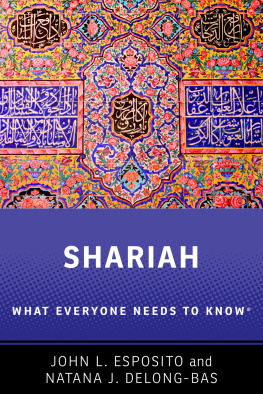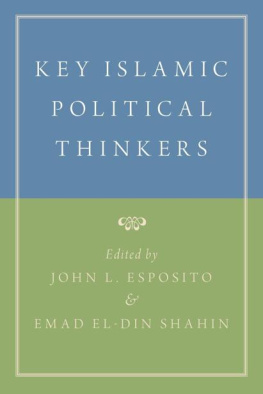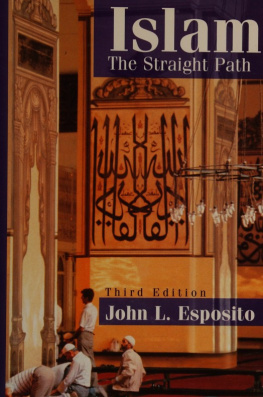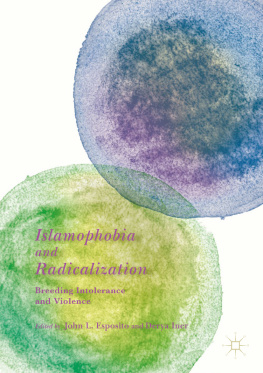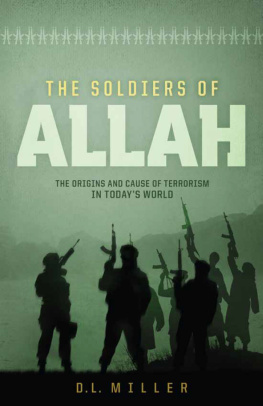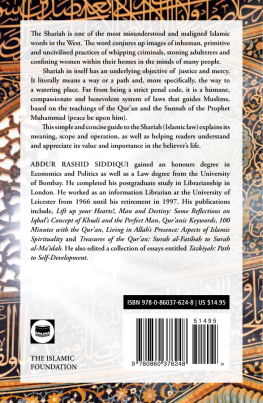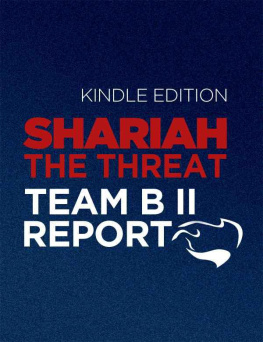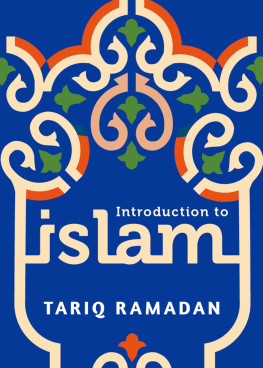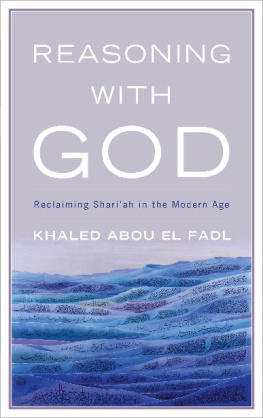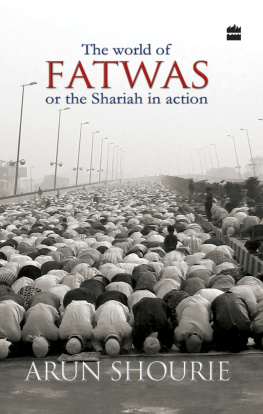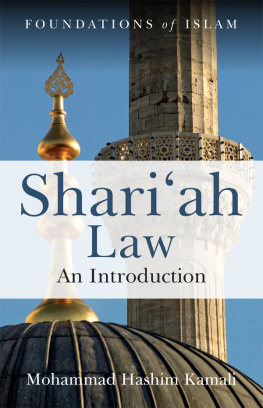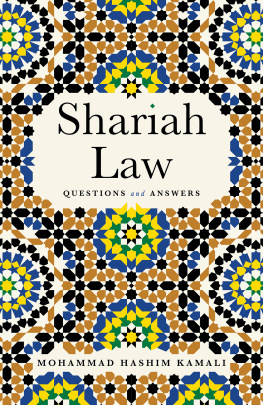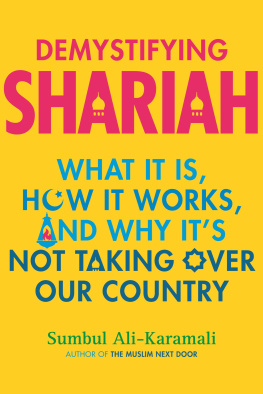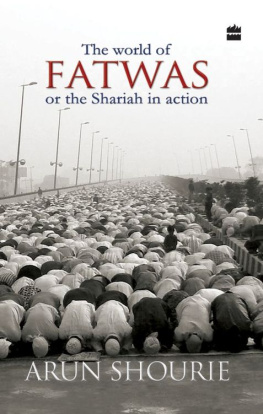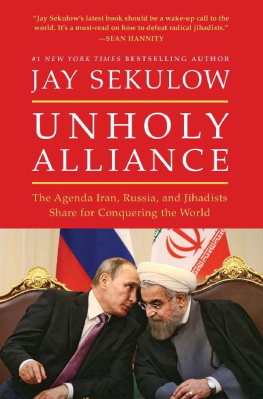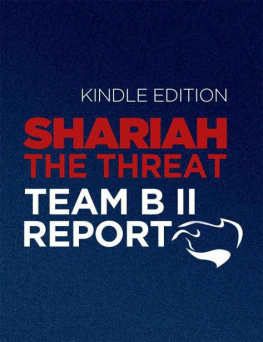Contents
Pagebreaks of the print version
SHARIAH
WHAT EVERYONE NEEDS TO KNOW

Oxford University Press is a department of the University of Oxford. It furthers the Universitys objective of excellence in research, scholarship, and education by publishing worldwide. Oxford is a registered trade mark of Oxford University Press in the UK and certain other countries.
What Everyone Needs to Know is a registered trademark of Oxford University Press.
Published in the United States of America by Oxford University Press
198 Madison Avenue, New York, NY 10016, United States of America.
Oxford University Press 2018
All rights reserved. No part of this publication may be reproduced, stored in a retrieval system, or transmitted, in any form or by any means, without the prior permission in writing of Oxford University Press, or as expressly permitted by law, by license, or under terms agreed with the appropriate reproduction rights organization. Inquiries concerning reproduction outside the scope of the above should be sent to the Rights Department, Oxford University Press, at the address above.
You must not circulate this work in any other form and you must impose this same condition on any acquirer.
CIP data is on file at the Library of Congress
ISBN 9780199325061 (pbk.); 9780199325054 (hbk.); 9780199325085 (epub.)
Some of the material in this book appeared previously, and in different form, in the following: Esposito, John L. 2002. Unholy War. New York: Oxford University Press. Esposito, John L. 2011. What Everyone Needs to Know about Islam. New York: Oxford University Press. Esposito, John L. 2013. The Future of Islam. New York: Oxford University Press. Esposito, John L. 2016. Islam: The Straight Path. New York: Oxford University Press.
John Esposito: For my brothers, Louis and Richard Esposito
and my sister, Susan Brown
Natana DeLong-Bas: For Dad and Ruth, who are always
there no matter what.
CONTENTS
This project has drawn on the talents of many contributors. We want to thank our student researchers Molly Wartenberg, Aamina Shaikh, Mona Mogahed, Nathan Lean, and especially Jason Welle and Tasi Perkins. We were especially fortunate to have colleagues in the US and overseas who agreed to read and review drafts for chapters of the book: Asifa Quraishi Landes, Jonathan Brown, Mohammed Fadel, Tamara Sonn, Khalid Masud, and Kathleen Moore. As with all his publications, Johns wife and partner, Jean Esposito, read the entire manuscript multiple times, providing advice, input and editing. Natana is grateful to her husband, Christophe, and children, Aurora and Gabriel, who lived with and believed in this project from its conception through its development and conclusion. Without the supportive environment they created, the book never would have seen the light of day.
Oxford University Press provided an excellent team. Special thanks to Cynthia Read, Executive Editor, who believed in the importance of this project from the outset, reviewed the manuscript and provided critical and constructive feedback. Drew Anderla, editorial assistant, provided quick and efficient assistance when needed. Nicholas Hunt shepherded the manuscript through the copyediting stages and production and kept us on schedule.
SHARIAH
WHAT EVERYONE NEEDS TO KNOW
Shariah: What Everyone Needs to Know provides informed answers to many questions and charges that surround the debate over Shariah and Islamic Law. As its title indicates, we have written for a broad nonspecialist audience as well as for policymakers, political commentators, religious leaders, and students.
Because this book is written for a general audience, we have minimized Arabic terms, professional jargon, and footnotes and have sought to simplify our language and level of detail in discussing difficult concepts. At the same time, because of the controversy over Shariah, when describing charges and countercharges, we have included more specific detail than might have been expected in responding to particularly contentious issues. In addition, our format in this questions-and-answers book requires some repetition so that various answers will be self-contained. While this allows the reader to jump from topic to topic more randomly, we nevertheless encourage readers to start with , which provide basic perspectives on Shariah that make topics in subsequent chapters easier to read and understand.
The eleven chapters of this volume cover key areas of Islamic law and the hot-button issues that arise today. In all of these chapters, we discuss both historical and contemporary interpretations as well as variations across countries and law schools, and between Sunnis and Shia. Our goal is to highlight the complexity, diversity, and flexibility of Shariah and its interpretation over time and space in order to show Islamic law as a living, dynamic process, ideally guided by the quest to uphold the common good (maslahah), human dignity, social justice, and the centrality of the community. At the same time, we critically note where these ideals have not been upheld and where and how reformers are seeking change.
Throughout the book it is clear how much power and authority the word Shariah carries. Historically, the word Shariah has been used not only in traditional Islamic law (fiqh) that guides Muslim lives but also to refer to laws created by rulers that were not derived from scripture, but were practical regulations for such areas as fair marketing, certain taxes, public safety, and security, all developed to maintain public order. This kind of governance was called siyasa [government policies or laws] Shariah because of the common belief that Shariahs purpose was to ensure the welfare of the people. So too, as will be discussed, the common good measured in terms of preserving peoples right to practice religion as well as faith, property, and dignity, is known as maqasid al-Shariah (principles or objectives of Shariah).
explores why so much fear is associated with Shariah and whether we need to protect American law from some impending threat. It compares the practice of Islamic law with other religious laws in America and presents data on Muslim attitudes toward Shariah, domestically and internationally, as well as data on Muslim attitudes toward living in the United States successfully.
, Shariah: The Big Picture, deals with the multilayered meanings of the powerful word, Shariah, looking at the terms origins and meaning; how Shariah is viewed by Sunnis and Shia; and how Shariah plays a key role in legal renewal and reform. This chapter also explores why it is important to distinguish between Shariah (unchanging principles and values originating from revelation) and Islamic law (human interpretations that are subject to change). We also highlight the objectives Shariah is intended to fulfill (maqasid al-Shariah) in discussing the ways that diverse law schools can provide jurists as well as individual Muslims with legal rulings relevant to varied environments and changing circumstances.
, Shariah Courts, focuses on the way Shariah courts work in comparison to other legal systems as well as on the roles of qadis (judges) and muftis (legal scholars and experts) in the development of Islamic law. Understanding the strengths and weaknesses of Shariah courts and how they have radically changed over time provides us with greater knowledge of current challenges and opportunities.

